If you want to explore profiles of famous public speakers, you’ll find stories of individuals like Winston Churchill, Nelson Mandela, and Mahatma Gandhi who master rhetoric, emotional appeal, and moral conviction to inspire change. Leaders like JFK and Elizabeth I used eloquence and strategic communication to unite people and lead transformation. Motivational figures like Tony Robbins and Brene Brown focus on resilience, vulnerability, and personal growth, while Dr. Jessica Houston‘s story of overcoming setbacks adds a unique perspective. Keep going to discover how their unique qualities can inspire your own communication journey.
Key Takeaways
- Famous public speakers are often distinguished by their mastery of rhetoric, emotional appeal, and strategic communication skills.
- Many leaders like Nelson Mandela and Mahatma Gandhi demonstrate authentic moral conviction and social change advocacy through their speeches.
- Inspirational figures such as JFK and Tony Robbins utilize charisma, storytelling, and innovative methods to motivate and empower audiences.
- Emotional intelligence, vulnerability, and relational awareness are key traits highlighted in speakers like Brene Brown and Dr. Jessica Houston.
- Their unique backgrounds, communication styles, and core messages contribute to their lasting influence and prominence.
Winston Churchill: The Master of War-Time Oratory
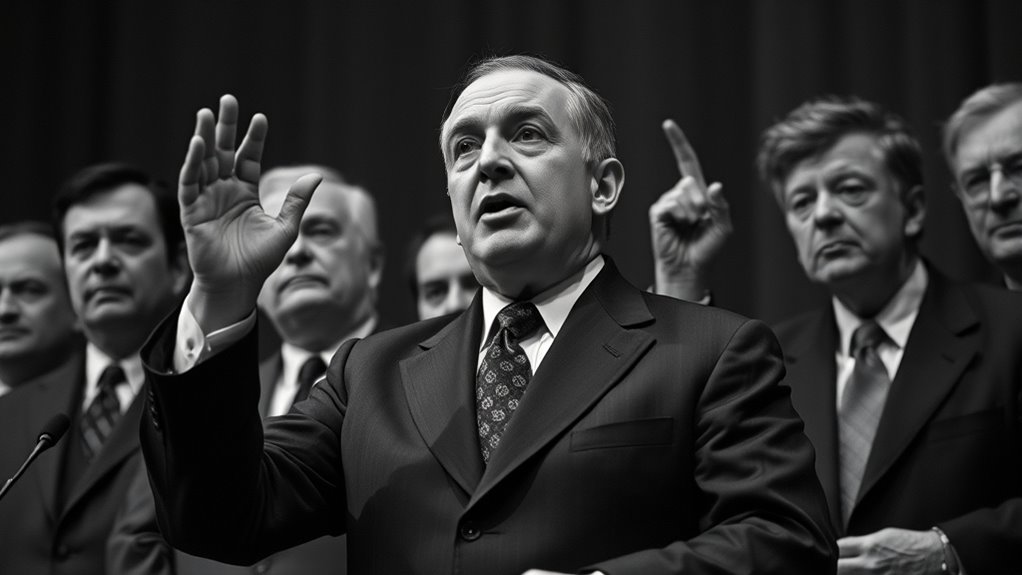
Winston Churchill stands out as one of history’s greatest masters of war-time oratory, inspiring a nation and shaping the course of World War II through his powerful speeches. When you hear his words like “We Shall Fight on the Beaches,” you realize how he boosted British morale during its darkest hours.
His leadership turned crises, such as the Dunkirk evacuation, into symbols of hope and resilience. Churchill’s speeches, including “Blood, Toil, Tears and Sweat,” conveyed unwavering determination and united the country against Nazi tyranny.
His emotional appeals, vivid metaphors, and calls to action resonated deeply with his audience. As a strategic communicator, he inspired national unity and earned international respect, leaving a legacy that continues to influence leaders and public speakers today.
Nelson Mandela: Voice of Freedom and Justice
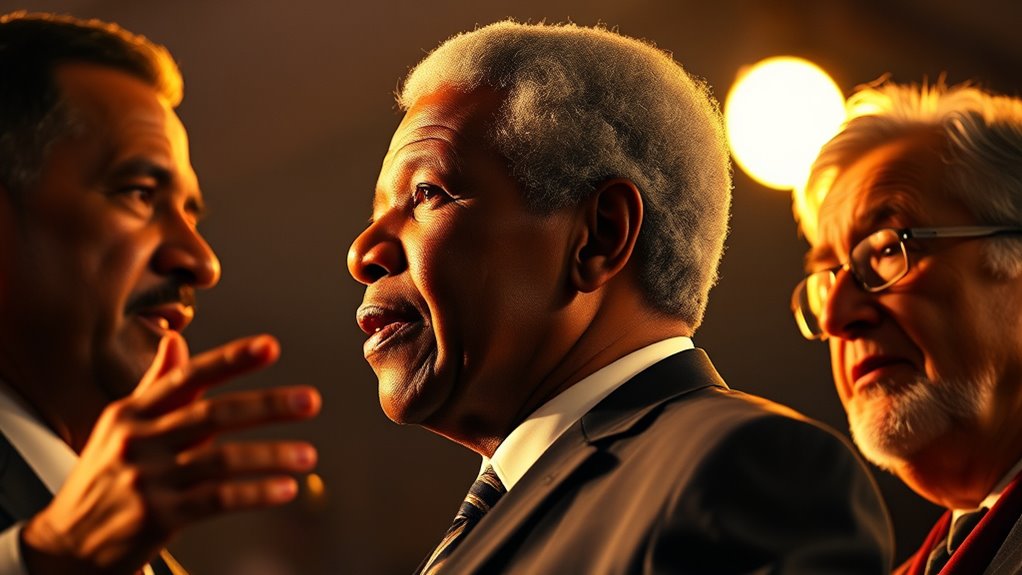
Have you ever wondered what makes a speech truly powerful? Nelson Mandela’s speeches resonate because he connects deeply with his audience, blending formal language with cultural and historical references. His journey—from 27 years in prison to leading South Africa’s metamorphosis—shaped his message of freedom, democracy, and reconciliation.
Mandela’s ability to adapt his tone and customize his speeches helped unite diverse groups and garner international support. His first public address after release at Cape Town’s City Hall set the tone for his leadership, emphasizing hope and justice. His mastery of anime culture and storytelling contributed to his compelling communication style that continues to inspire worldwide. Engaging with life-changing quotes from great minds can further enhance one’s understanding of impactful communication.
Through his words, Mandela championed peace, forgiveness, and equality, inspiring millions worldwide. His speeches remain a testimony to the power of authentic, purpose-driven communication that promotes social change. Additionally, drawing on wisdom from ancient civilizations can provide timeless insights into the importance of truth, justice, and moral responsibility in effective leadership. Developing public speaking skills was crucial for Mandela’s success in inspiring collective action and fostering unity. Recognizing the importance of cultural context helped him tailor his messages to resonate across different audiences and backgrounds.
Mahatma Gandhi: Champion of Nonviolent Resistance
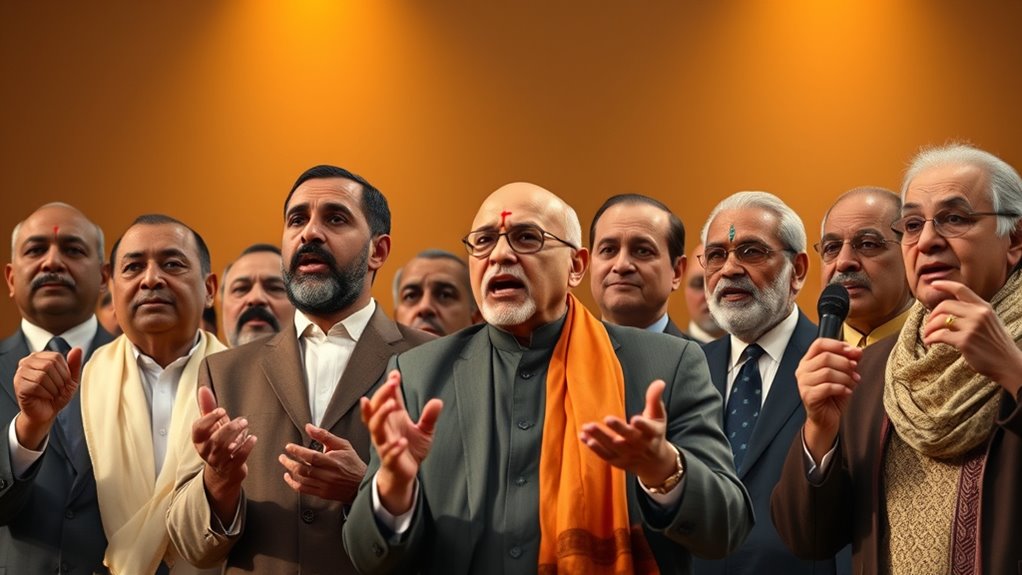
Nelson Mandela’s powerful speeches showcased the importance of authentic communication and moral conviction. Mahatma Gandhi exemplified this through his unwavering commitment to nonviolent resistance, inspiring millions worldwide. His philosophy of Satyagraha, a peaceful form of civil disobedience rooted in truth and nonviolence. Gandhi’s principles of Ahimsa, truth-force, and nonviolent direct action fueled key movements like the Salt March and Quit India Movement, challenging unjust laws without violence. His leadership transformed India’s fight for independence and influenced global civil rights efforts. Gandhi’s simple living and moral integrity made him a symbol of humility and inclusivity. His legacy endures in countless movements advocating peace, justice, and social change, reminding you that moral strength can challenge even the most entrenched injustices. Understanding civil disobedience offers insight into his strategic approach to social change. Additionally, Gandhi’s emphasis on moral authority demonstrated that ethical credibility can be a powerful tool in mobilizing mass support. His mastery of nonviolent resistance techniques remains a vital lesson for contemporary social activists seeking peaceful change. Furthermore, his ability to maintain a high vibrational energy through peaceful persistence played a crucial role in sustaining the moral high ground during prolonged struggles.
J.F. Kennedy: The Inspirational American Leader
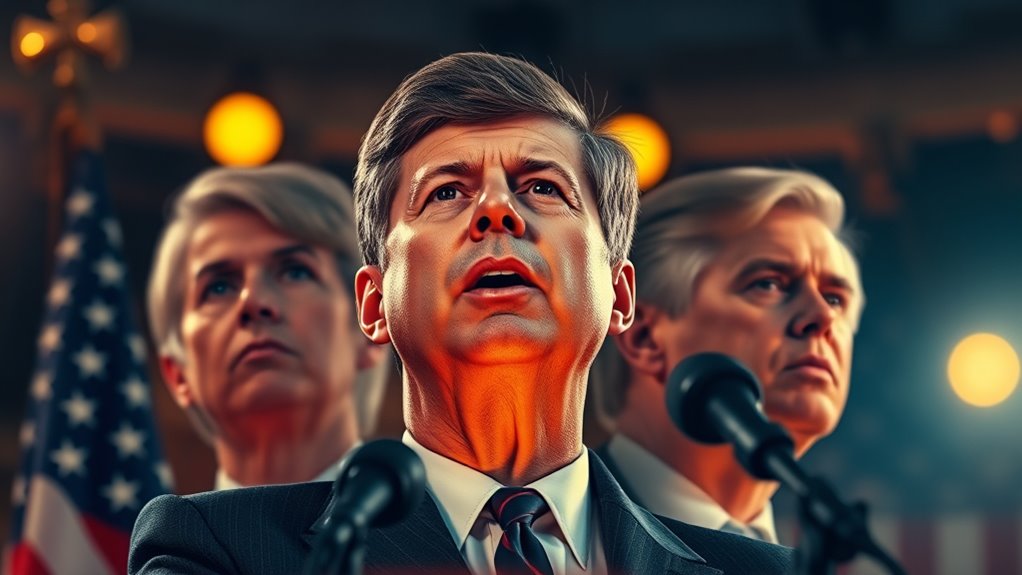
J.F. Kennedy captured America’s imagination through his charisma and eloquence. Born in 1917, he graduated from Harvard and served bravely in World War II. You might admire how he shifted into politics, serving as a Congressman and then a Senator before becoming president. Kennedy’s leadership style combined inspiration, innovation, and courage. His speeches, like the iconic “Ask not,” mobilized citizens and inspired youth to serve. He championed major initiatives such as the Peace Corps and the space race, emphasizing hope and progress. During crises like the Cuban Missile Crisis, his calm and decisive actions showcased his strength. Kennedy’s legacy endures as a symbol of leadership that united and motivated a nation toward a brighter future. His ability to connect with outdoor enthusiasts and the American public alike demonstrates his timeless appeal and leadership qualities. Additionally, his capacity for self-understanding and connecting with diverse audiences contributed significantly to his enduring influence. Studies of his communication skills reveal the importance of effective messaging in leadership. His emphasis on public communication and storytelling played a crucial role in shaping his inspiring image. Furthermore, his use of persuasive speech techniques helped solidify his message and inspire collective action.
Elizabeth I: Eloquence and Leadership of the Elizabethan Era

How did Elizabeth I master the art of rhetoric to solidify her authority in a male-dominated world? You see, her exhaustive education in humanist studies and multiple languages sharpened her speaking skills. She learned rhetorical forms like Petrarchan sonnets, which she used creatively to avoid direct questions about marriage.
Her speeches combined complex language, vivid imagery, and veiled defiance, allowing her to communicate power subtly. Elizabeth employed sprezzatura to connect with her audience and used the threat of death as a potent rhetorical tool. Her strategic use of language also included understanding rhetorical forms, which further enhanced her ability to craft persuasive messages that resonated with her audience. Additionally, her mastery of elocutio, the art of effective expression, helped her refine her speeches to maximize impact. Her awareness of mental resilience enabled her to maintain composure and persuasive power under pressure.
Her notable speeches, such as her Latin oration at Cambridge and political addresses, reinforced her strength and independence. Through eloquence and strategic communication, she shaped her image as a powerful, capable leader, transcending gender expectations in a patriarchal society. Her deliberate use of rhetorical devices allowed her to persuade her listeners and maintain her authority effectively.
Tony Robbins: The Powerhouse of Motivation
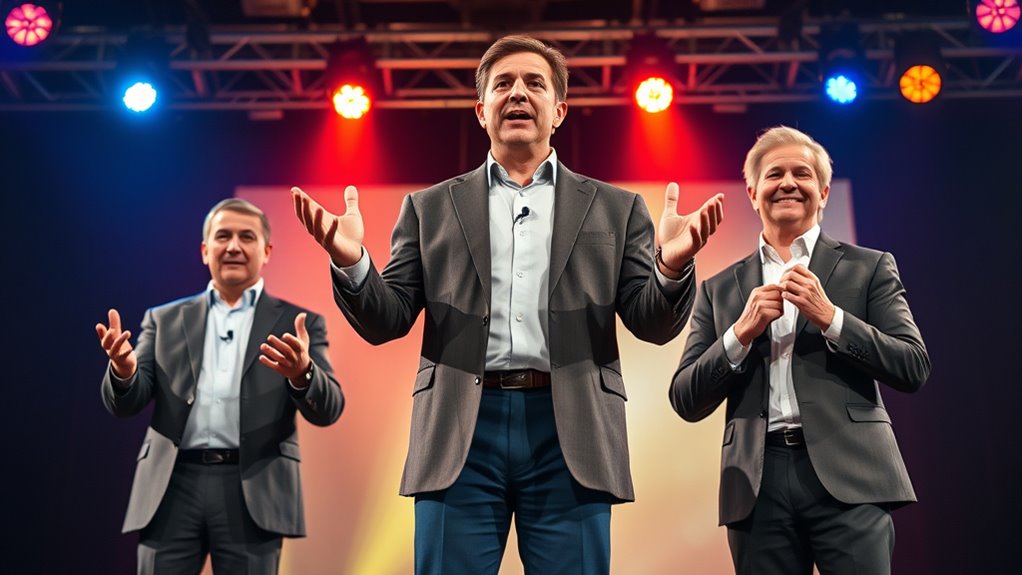
Tony Robbins has become a defining figure in the world of motivation through his dynamic speaking style and innovative methods. Starting at age 17, you might be surprised to learn he promoted seminars for Jim Rohn, who mentored him early on.
In 1983, he founded Robbins Research International, launching his self-help empire. His expertise in NLP and Ericksonian Hypnosis, learned in the 1980s, helped shape his powerful communication techniques.
You’ve likely heard of his best-selling books like “Unlimited Power” and “Personal Power,” which reached millions.
Robbins’s high-energy seminars, including firewalking, symbolize overcoming personal barriers.
Beyond speaking, he’s committed to philanthropy through his foundation, providing millions of meals, education, and disaster relief.
His journey from poverty to global influence exemplifies resilience and a relentless drive to motivate others.
Brene Brown: Embracing Vulnerability and Empathy

Brene Brown’s work revolutionizes how you understand human connection by emphasizing the power of vulnerability and empathy. Her research shows that embracing uncertainty and sharing your authentic self fosters deeper relationships. She highlights shame as a major barrier to connection—fueled by the fear of disconnection—and advocates for empathy as a powerful tool to counteract it. Through qualitative methods like interviews and case studies, she uncovers the emotional dynamics that shape human behavior. Brown stresses that vulnerability isn’t a weakness but a strength essential for trust and authenticity. Her insights inspire leaders and individuals to show genuine courage, practice compassion, and communicate openly. Additionally, understanding the importance of emotional dynamics in relationships can further enhance efforts to build genuine connections. Recognizing how emotional responses influence behavior can deepen your empathy and improve your relational skills. Exploring the role of skincare ingredients like glycolic acid in personal care routines highlights how self-care practices can support emotional well-being and confidence. Developing awareness of emotional intelligence can also help in managing interpersonal interactions more effectively.
Dr. Jessica Houston: Empowering Through Personal Triumph
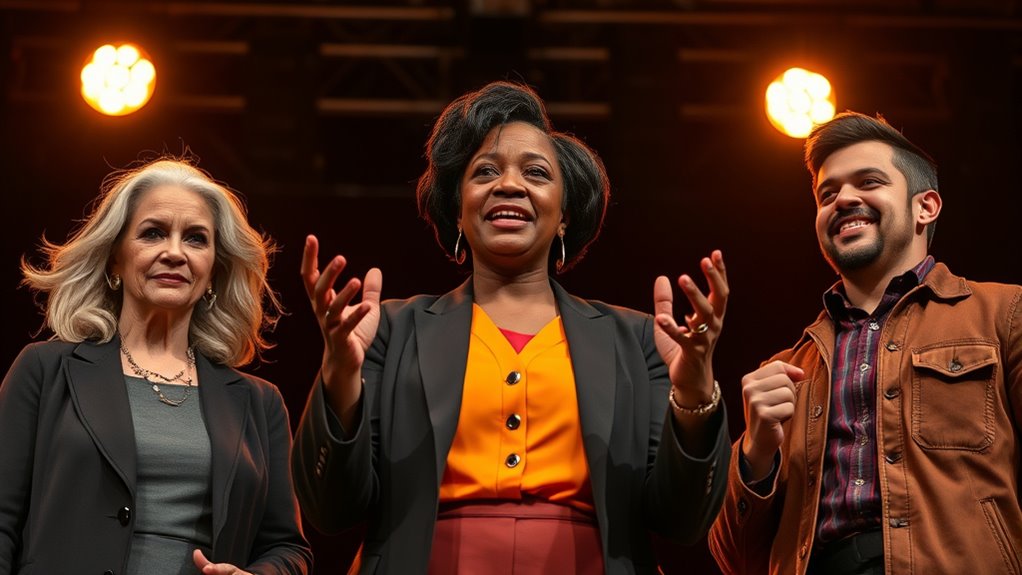
Have you ever wondered what it takes to turn personal setbacks into powerful sources of motivation? Dr. Jessica Houston does just that through her inspiring storytelling.
Recognized worldwide as a transformational speaker and wellness expert, she focuses on leadership and personal development. Her energetic, engaging presentations resonate with diverse audiences, encouraging change and growth.
As a best-selling author, she shares insights that empower individuals to overcome challenges and realize their potential. Whether speaking at conferences or community events, her messages promote well-being and resilience.
With a background spanning social work and chemical engineering, Dr. Houston brings a unique perspective to her work. Her ability to turn personal triumphs into lessons for others makes her a truly impactful figure in public speaking and personal empowerment.
Frequently Asked Questions
What Common Traits Do These Speakers Share Despite Their Different Eras?
You’ll notice that despite their different eras, these speakers share key traits. You see confidence, which helps engage your audience. You’ll find storytelling ability, making your message memorable.
Adaptability is vital—you adjust based on your audience’s needs. Clarity guarantees your point is understood, while authenticity builds trust.
Maintaining eye contact, using compelling body language, and connecting emotionally make your speech impactful and relatable, regardless of the time period.
How Did Each Speaker Influence Their Respective Societies or Fields?
You might think these speakers only inspired through words, but they truly transformed their societies. Martin Luther King Jr. advanced racial equality; Winston Churchill boosted British morale during WWII; Mahatma Gandhi promoted non-violent resistance; Malala Yousafzai advocates for girls’ education; Nelson Mandela fought apartheid and fostered reconciliation.
Their speeches and actions rallied support, shifted public opinion, and created lasting change, shaping history and inspiring future generations worldwide.
What Techniques Did These Speakers Use to Engage and Inspire Their Audiences?
You can engage and inspire your audience by speaking directly to them, making your message feel personal. Use relatable stories and humor to create emotional connections, keeping your tone conversational.
Organize your content clearly, monitor audience feedback, and stay adaptable. Use a confident voice, gestures, eye contact, and authenticity to build trust.
A strong opening and memorable conclusion will leave a lasting impact, motivating your listeners effectively.
How Have These Speeches Impacted Future Generations of Public Speakers?
Your speeches have inspired future generations by showcasing powerful rhetorical techniques like repetition, metaphors, and storytelling. You demonstrate that combining eloquence, passion, and authenticity creates emotional connections and leaves lasting impressions.
Your emphasis on vulnerability and engagement through modern media also shapes how others communicate today. By inspiring social movements, advocacy, and leadership, your words continue to influence and empower new speakers across diverse fields worldwide.
What Challenges Did These Speakers Face in Delivering Their Most Famous Speeches?
You face challenges like stage fright, fear of judgment, and maintaining a clear structure. Even the most famous speakers struggled with anxiety or forgetting words, but they prepared thoroughly, practiced, and used techniques like deep breathing to stay calm.
They also focused on organizing their messages and engaging their audience. By overcoming these obstacles, they delivered powerful speeches that resonated and left lasting impressions.
Conclusion
You see the power of words in their courage, their conviction, and their compassion. You witness how they inspire change, ignite hope, and foster connection. You realize that great speakers don’t just communicate—they transform. They challenge you to think differently, feel deeply, and act boldly. And in doing so, they leave a lasting legacy of influence, empowering you to find your own voice and make your mark in the world.









